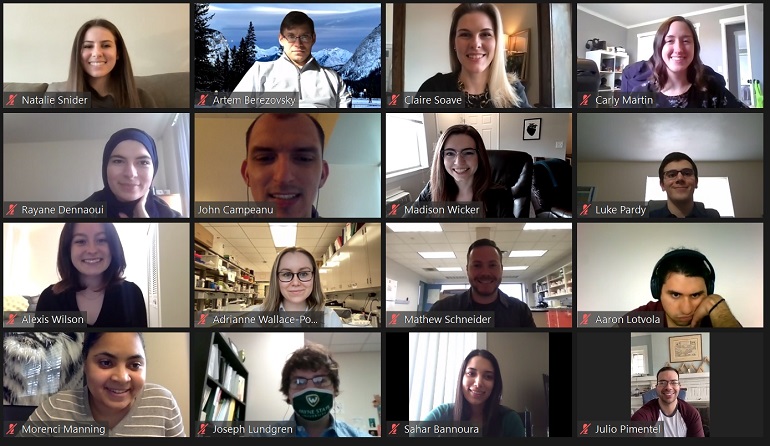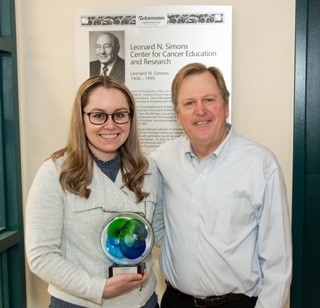
The Wayne State University School of Medicine’s Cancer Biology Graduate Program held its 10th annual Research Symposium virtually on March 26.
A tradition that began when the Cancer Biology Graduate Program found a permanent departmental home in the Department of Oncology, the symposium continues to gain momentum each year.
“The principal goal of our symposium is to highlight the research accomplishments of our 24 Ph.D. and M.D./Ph.D. students by giving them an opportunity to present their research,” said Cancer Biology Graduate Program Director Larry Matherly, Ph.D. ”After cancellation of last year’s symposium due to the pandemic, both students and faculty were committed to staging this year’s virtual symposium.”
Dr. Matherly kicked off the event, which included remarks by doctoral students Katie Hege Hurrish and Julio Pimentel, who led the symposium’s planning committee.
The graduate symposium is combined with a graduate student recruiting day to “permit prospective and incoming Ph.D. students a chance to meet current students and faculty, and to experience our dynamic and supportive training environment in Cancer Biology at Wayne State and the Karmanos Cancer Institute,” Dr. Matherly said.

A tradition at the annual event is the announcement of the Leonard N. Simons Award for Exemplary Research and Scholarly Achievement, awarded each year to a Cancer Biology student who has distinguished him- or herself in scholarship and leadership. This year’s Simons Award went to Adrianne Wallace-Povirk, a doctoral candidate in her fifth year in the Cancer Biology Graduate Program.
She felt “pure shock” when her name was called. “I was not expecting to receive the Simons Award. After listening to Mary Lou Zieve -- Leonard Simons’ daughter -- speak about her father’s desire to support trainees and hearing my name called, I got quite emotional,” she said.
Wallace-Povirk’s dissertation research topic involves the discovery of novel therapeutics targeting mitochondrial and cytosolic one-carbon metabolism in epithelial ovarian cancer. She is mentored by Dr. Matherly. She chose Wayne State for her doctoral training after working as a research assistant in Dr. Matherly’s lab.
“When someone who was instrumental in my childhood passed from ovarian cancer, it was the impetus for me to join the program. The research became very real to me,” she said. “We have identified a unique metabolic target in the mitochondria we believe is critical for ovarian cancer growth/progression and are developing drugs to inhibit this target.”
In 2016, the Leonard N. Simons Award for Exemplary Research and Scholarly Achievement was established in the Cancer Biology Graduate Program at the Barbara Ann Karmanos Cancer Institute and WSU. Simons served as the first chair of the board of Michigan Cancer Foundation (now the Karmanos Cancer Institute) and throughout his life he was a passionate supporter of Detroit’s efforts in the fight against cancer. The award pays tribute to Simons and his dedication to excellence in science and education. The Leonard N. Simons Cancer Research Endowment provides funding for the Leonard N. Simons Award for Exemplary Research and Scholarly Achievement.
“I’ve always loved puzzles, and cancer is truly the world’s most complex one. Figuring out what could be an Achilles heel for a tumor, speaking in terms of a metabolic vulnerability, is a unique challenge. Cancer research will always be a game of cat and mouse, but having the chance to discover an important target, especially in a disease who affected someone I knew, is a rewarding pursuit,” Wallace-Povirk said.
The symposium’s keynote speaker was alumnus Kara Sawarynski, Ph.D., an associate professor and co-director of the Embark Research Program at the Oakland University William Beaumont School of Medicine. Dr. Sawarynski completed her doctoral studies under the mentorship of Dr. George Brush.
This year’s symposium included 17 oral presentations from Cancer Biology students. Four cash awards ranging from $200 to $500 for best oral presentations were announced at the end of the event. The winners were:
First: Claire Soave, for “New Insights into Interactions of the Androgen Receptor with ELK1 and the Platform Antagonist KCI807.” Mentor: Manohar Ratnam, Ph.D., professor of Oncology.
Second: Morenci Manning, for “Clinical Significance, Functional Role and Molecular Mechanism of 2’-O-methyltransferase FTSJ3 in Promoting Cancer Progression.” Mentor: Zeng-Quan Yang, Ph.D., associate professor of Oncology.
Third Prize: Carly Martin, for “Post-translational Modifications of the Pro-oncogenic Protease TMPRSS13.” Mentor: Karin List, Ph.D., professor of Pharmacology.
Fourth: Adrianne Wallace-Povirk, for “Targeting Mitochondrial and Cytosolic One-Carbon Metabolism in Epithelial Ovarian Cancer via Folate Receptor Alpha.” Mentor: Larry Matherly, Ph.D., professor of Oncology.